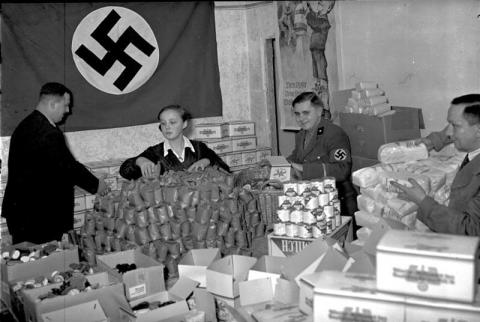The Heretics' Hour: What is and isn't National-Socialism
June 30, 2014
Of the Winterhilfswerk Hitler said, “This great campaign against hunger and cold is governed by this principle: We have broken the international solidarity of the proletariat. We want to build the living national solidarity of the German people!”
National-Socialism cannot easily be separated from Adolf Hitler and the German Third Reich even though some try to do it. To put it in biblical language, Many say they are National-Socialist, but few there are who can truly demonstrate it.
- Four examples in as many days of those claiming to be N-S when Carolyn thinks they don't quite fit the bill;
- The foundations of National-Socialism lie in the German Volkisch nationalist movement combined with the anti-communist Freicorps paramilitary culture following the World War, plus the humiliation of Versailles;
- Where and how Fascism and Nat-Soc veer away from each other;
- Idealism is a characteristic attributed to Germans in particular which is abused by the Jewish spirit of selfishness and materialism;
- Scientific racism and antisemitism are essential to protect the Folk, otherwise it's only economic theory;
- Carolyn reads off some of her family genealogy and talks a little bit about her family culture.
Category
Adolf Hitler, Germany, Heretics' Hour Podcast, National Socialism- 1309 reads











Comments
Sankt Ana is in Arad county,
Sankt Ana is in Arad county, close to Arad city, one of the most important cities in Hungarian and Romanian history.
http://en.m.wikipedia.org/wiki/Arad,_Romania
Rose came to the U.S. with her parents
I get so disgusted with myself the way I "forget" the details, which I haven't really forgotten but just lose sight of at times when I'm talking more than thinking. It's not important, but this evening, taking a walk, I remembered saying about my grandmother's sister Rose, "How did she get here anyway?" That was stupid because I know my grandmother Barbara came with her parents (mother and stepfather) when she was 12 years old. She told me that, plus I read about it in her obituary, I think. Therefore, Rose would have been 16 years old and that's how she "got here."
Another not so important detail I failed to mention is why no one had middle names. Ordinary Catholics at that time didn't get middle names at birth, but at confirmation (12 yrs?) they selected a 2nd name (usually a saint's name). My mother, who didn't have a middle name, chose JoAnne and then gave that to my sister for her middle name, too. For some reason, Joseph and it's female variations was real popular in the Reck family line. My mother's brother was named Joseph. His first-born son, also named Joseph, named his first daughter JoAnn. That's how it was.
Markus: I couldn't remember the name Arad on the program either, so thanks for posting something about it. It reminds us that Germans were always in that area in some capacity, as they are just about everywhere in the world.
History of Translyvanian Germans
A fair study paper on Translyvanian Germans (including Arad).
http://expelledgermans.org/transylvaniasaxons.htm
Germans of Hungary
I know the person who's responsible for this site, but he's not all that Hitler-friendly. My family would fit on the Germans of Hungary page, http://expelledgermans.org/hungarygermans.htm.
Quote: "This large-scale ethnic German immigration was in part intended to resettle the Hungarian cities of Buda and Pest that had been almost completely depopulated by the pillaging and displacement wrought by the Muslim janissaries of the Ottoman Empire. Most settled along the Danube river, coming primarily from Baden, Württemburg, Bavaria, and Hessen. As most spoke the Swabian vernaculars of German and came from the southwestern region of Swabia, the German settlers in Hungary became generally known as Danube Swabians (Donauschwaben), although their rural villages spoke a number of dialects and retained various regional traditions (Molnar 2001, 181). The prevalent majority of Danube Swabians were Catholic due to the compulsion of the Habsburg state and the religious culture of southern Germany."
"So too, nearly 200,000 Danube Swabians had emigrated out of Hungary from 1880 to 1910 in reaction to fiscal and political tumult (ibid)." My grandparents and great aunts and uncles were a part of that emigration.
I'm also familiar with the great artist of the Danube Swabians named Stefan Jaeger, the same as my grandfather, but there is no family relation that I know of. I've read all about him but I can't find any connection; however he was in that very same area.
It was very interesting to
It was very interesting to read. Transylvania was largely developed by the German settlers. The Germans dominated farming, architecture and arts and developed the seven major cities there. He may not be pro-Hitler, but his overall writing is very well outlined. A journey to Siebenbürgen would be worth it.
Very good commom sense
I like that picture and the words underneath.